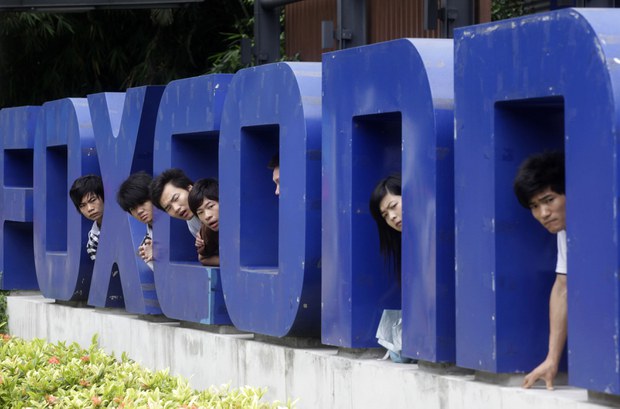Taiwanese iPhone maker targeted by Beijing
Share

Workers look on from a Foxconn logo near the gate of a Foxconn factory in the township of Longhua, Guangdong province May 29, 2010.
iPhone assembler Hon Hai Precision Industry, which employs hundreds of thousands of Chinese in various provinces, is facing tax audits and on-site investigations, according to the Global Times.
On Sunday, China’s state nationalist tabloid cited anonymous sources as stating audits were being carried out on key enterprises of the Taiwanese company, also known as Foxconn, in Guangdong and Jiangsu provinces.
The paper also said the country’s Natural Resources Department is conducting on-site investigations into the land use of key enterprises of Foxconn in Henan and Hubei provinces.
Some analysts, writing on social media called it yet another shot across the bow of U.S. business interests in China; others wrote that Foxconn founder Terry Gou was being warned to back off from his presidential ambitions, which threaten todivide the opposition vote in Taiwan and hand the elections to the incumbent Democratic Progressive Party (DPP).
But the Global Times dismissed conjecture that Foxconn is being investigated because Gou is running in Taiwan’s January presidential elections, arguing that “Chinese mainland experts” described the investigations as “normal and legitimate, as any company goes through tax inspections.”
The same report, however, noted that Gou shared his political stance with the Kuomintang (KMT), Taiwan’s main opposition party, and his presidential run “is likely to further divide the island’s opposition camp, and this will in the end favor secessionist ruling Democratic Progressive Party’s candidate Lai Ching-te.”
Beijing has severed all communications with the DPP, which it regards as a “Taiwan separatist party.” It will have achieved an unprecedented third term if it wins the January polls under current Vice President Lai Ching-te, whom Beijing particularly reviles for his past open support of Taiwan independence.
Lai has in recent years fallen into line with current president Tsai Ing-wen’s “gently, gently” approach to diplomacy but has in the past referred to himself as a “practical worker for Taiwan independence.”
Lai supported Hon Hai at a campaign event Sunday. “China shouldn’t force Taiwanese companies to declare their position whenever an election is taking place,” he said. “China should acknowledge Taiwanese companies contribute to its economy greatly.”
Premier Chen Chien-jen said on Monday that the Taiwan government has been in touch with Foxconn and will help as necessary.
Hon Hai, which does the vast majority of its manufacturing in China, wrote in a filing to the Taiwan Stock Exchange Sunday that “legal compliance is the basic principle for the group’s operations around the world,” adding that it would “cooperate with relevant agencies” over the investigation.
Gou for president, Cook in China
Hon Hai founder Gou stepped down as Foxconn chief in 2019 after a sea goddess known as Matsu, or Mazu, allegedly whispered in his ear amid wafting incense that he should stand for Taiwan’s presidency.
The precise number of followers of Matsu in Taiwan is unknown, but she has some 900 temples dedicated to her and she’s widely revered as “Goddess of Peace of the Straits” and patron saint of fisherfolk and seafarers.
Gou’s 2019 bid failed despite the celestial endorsement, but this year he was back and in August he announced he was entering Taiwan’s 2024 presidential elections asan independent candidate after again failing to secure the nomination for the Kuomintang party earlier this year, as was the case in 2019.
His entry to the presidential face-off now pits three opponents with broadly similar political and business leanings against a united DPP represented by Lai. Opposition supporters fear that if the three would-be presidents cannot do a deal, Lai is a shoe-in for president, which is Beijing’s most feared outcome.
Meanwhile, despite his spiritual leanings, Gou cannot be underestimated in the world of technology.
Foxconn is Apple’s leading assembly partner, and its chief assembly location, Zhengzhou in Henan Province provides so many jobs it’s known colloquially as iPhone City.
In what may simply be a coincidence, Apple CEO Tim Cook arrived in Beijing on Friday – his second visit this year – where he declared support for “win-win collaborations” with Commerce Minister Wang Wentao.
The unexpected move came shortly after Beijing banned senior state employees from using Apple phones and disappointing sales of the company’s new iPhone 15.
On Saturday, Cook met Chinese Vice-Premier Ding Xuexiang. The two espoused a return to business as usual and a willingness to overcome controversies about national security and censorship.
Meanwhile, the Hon Hai investigations continue with next to no public knowledge as to why, although the Global Times quoted an expert who said that “while Taiwan-funded enterprises, including Foxconn, are sharing in dividends from development and making remarkable progress in the mainland, they should also assume corresponding social responsibilities and play a positive role in promoting the peaceful development of cross-strait relations.”
Edited by Mike Firn and Taejun Kang.







